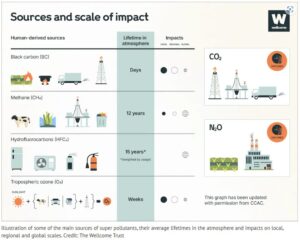Website – UKSSN Operations Group
LinkedIn – (3) UK Schools Sustainability Network Operations Group | Groups | LinkedIn
“There is much more work to be done to keep 1.5 °C within reach and prevent climate catastrophe. The scale of the challenge is huge, but through collective action we can deliver change at the scale and pace required.” (Kerry McCarthy, Minister for Climate)
In 1306, King Edward I of England issued the first known air quality law, banning the burning of sea coal within London city limits—on pain of death ☠️. Fast forward six centuries and we have the first publication linking coal burning to climate change.

Another century later and we are finally seeing coal production falling. Over the past decade, coal power use in the European Union (EU) has fallen by 61%. The UK’s last coal-fired power plant, Ratcliffe-on-Soar in Nottinghamshire, closed in Autumn 2024, ending our 142-year era of burning coal to generate electricity. A good news story…but one with a sting in its tail. Between 1882 and 2024 the UK’s coal plants burned through an estimated 4.6bn tonnes of coal and emitted 10.4bn tonnes of carbon dioxide (CO2) – more than most countries have ever produced from all sources. Almost all new coal power is now being built in just 15 countries, with India and China home to 86% of proposed new coal plants. Yet it is difficult to blame the governments of less affluent countries – particularly when high income countries are failing to meet financial and legal obligations to these countries who have contributed little to the emissions that are driving climate change but stand to suffer most from a warming planet.
The history of burning coal is a great illustration of the complex nature of climate change, rooted in science but with solutions that involve an array of competing cultural, technological, economic, and political issues. The UK has a key role to play in addressing the climate crisis, but we will only succeed if our education sector – the provider of knowledge, skills, beliefs, and actions to the nation – delivers on its obligations to the next generation.
This week from UKSSN Ops Group –
- DfE update: January snapshot report
- Adaptation: Investing for a changed climate
- Health: Super pollutants
- Health: Vehicle pollution, hedging and travel plans
- Procurement: iAM Compliant
- Support: Greener Schools Index
- Nature: Education Nature Park – Winter
- CPD: SALIX Finance Decarbonisation Dialogue
- CPD: Sustainability conferences and events scheduled for 2025
- And finally…Lidl
- Plus….advice, support and useful references
📰 DfE Update: January Snapshot 📰
DfE’s Climate in Education Snapshot- January 2025
Hot off the press, this month’s update from the DfE includes:
- DfE’s Sustainability and Climate Change strategy: next steps
- Sustainability Support Hub: New Year, New Look
- Climate Action Plans: Linking Cutting Edge Research With School Curricula
- Simplifying Recycling Through Reforms
- Canteen to Classroom
- Sky Primary and The Eden Project Nursery
- Nature Based Learning in Education
- Information you may find useful
Great to hear that the strategy is undergoing a refresh, with a view to building on the foundations laid since the strategy was first published in 2022. It is a privilege to be part of the conversation.
Also from DfE this week – https://educationhub.blog.gov.uk/2025/01/everything-we-are-doing-in-education-to-tackle-climate-change-here-is-what-you-need-to-know/
🏫 Adaptation: Investing for a changed climate 🏫
Climate Adaptation & Resilience for Business
According to S&P Global, only 1 in 5 organisations have an adaptation plan in place. To support organisations on their adaptation journey, the UN Global Compact Network UK is hosting a five-part webinar series through March and April. Open to all, this series will offer practical guidance on how organisations can undertake climate risk assessments to establish business continuity plans aligned with various climate scenarios, and the steps they can take to safeguard their infrastructure, operations, supply chains, and workforces from climate change hazards.
Sessions include:
- Assessing and Managing Climate Risks – 18 March, 2 pm to 3:30 pm GMT
- Enhancing Operational Resilience – 25 March, 2 pm to 3:30 pm GMT
- Futureproofing Supply Chains – 1 April, 2 pm to 3:30 pm BST
- Protecting Workers & Communities from Climate Hazards – 8 April, 2 pm to 3:30 pm BST
- The Role of Finance and Insurance – 15 April, 2 pm to 3:30 pm BST
🩺 Health: Super pollutants 🩺
Guest post: How ‘super pollutants’ harm human health and worsen climate change – Carbon Brief
Super pollutants – methane, black carbon, fluorinated gases, nitrous oxide, and tropospheric ozone are responsible for around 45% of global warming to date, as well as millions of premature deaths annually. Poor air quality caused by these pollutants has been linked to a series of heart and respiratory diseases, as well as lung cancer and strokes.

Schools are directly and indirectly responsible for super pollutant emissions. Reliance on fossil fuels, fridges, and air-conditioning (particularly when poorly maintained), catering, waste are all contributing factors. Cutting emissions of super pollutants is one of the most effective ways to “keep 1.5C alive” in the near-term, while protecting health and avoiding tipping points that could cause irreversible shifts in the Earth system. Combined with the health benefits, an effective Climate Action Plan can help reduce emissions of these pollutants and is a clear win-win for people and the planet.
🩺 Health: Vehicle pollution 🩺
Roadside hedges can reduce harmful ultrafine particle pollution around schools | University of Cambridge
Closer to home, a study in 2023 led by Cambridge University confirmed that planting hedges between roadsides and school playgrounds can dramatically reduce children’s exposure to traffic-related particle pollution. If hedging is not already part of your biodiversity plan have a read and consider how and where it could be introduced as part of your school travel plan.
Modeshift STARS is the Centre of Excellence for the delivery of Effective Travel Plans in Education, Business and Residential settings. The scheme recognises schools, businesses and other organisations that have shown excellence in supporting cycling, walking and other forms of sustainable and active travel.
🛒 Procurement: Suppliers supporting Sustainability 🛒
Sustainability 101 in Education | FREE Resources
iAMCompliant.com | Sustainability
To achieve our net zero ambition, we need our suppliers to be fully aligned with our aims. The majority of our carbon footprint comes from the goods and services we buy from the private sector. iAM Compliant are the latest supplier to offer a new sustainability tool. We are not an iAM customer, but we would welcome feedback from any school or Trust that makes use of the tool (or anything of a similar nature).
📋Support: Greener School Index (GSI)📋
The GSI is a free tool self-assessment tool designed to support all schools, however big or small, and at whatever stage they are on their net zero journey.
- Helps you evaluate your school’s progress, strengths and areas for improvement in essential areas such as air quality, biodiversity, catering management, energy, ICT, procurement, waste management and water.
- Each completed survey generates an individual pdf report of responses that can be shared with Governors and Trustees, or used to inform a Climate Action Plan and help develop your school’s sustainability roadmap.
The first pilot of the GSI will run until 28th February 2025 and will help you assess your current level of climate action and identify areas for further development. Give it a try…it is free and a particularly useful planning tool.
🦋Nature: Education Nature Park – Winter🦋
What to do with the Nature Park this winter | Education Nature Park
From the Nature Park (who now have 4,000 schools signed up and working to improve nature and biodiversity in their school grounds 🙂) – short days and grey skies may lead you to think that there’s not much going on outside at this time of year, but this could not be further from the truth! Embrace the winter season by having a go at some of their suggested activities over the next few months.
📅 CPD: Salix Finance – the Decarbonisation Dialogue 2025 series (29th January, 2pm) 📅
Decarbonisation Dialogue 2025 series is an opportunity to learn about how organisations across the public sector are addressing net zero challenges. Expert speakers will share insights into the opportunities, challenges and lessons learned through energy efficiency and decarbonisation projects completed on organisational estates.
📅 CPD: Sustainability Events 📅
It is great to see an increase in regional and national events to support schools and Trusts. We promote training on the website where all Members have facility to add local or regional events. Here are just a few to look forward to.
- Education Estates and School Building Conference, London (28th January 2025)
- Climate and Nature Action Event in Cambridgeshire (3rd February 2025)
- East of England Sustainability in Education Series with updates from DfE in Bedfordshire (12th February 2025), Essex (26th March 2025) and Suffolk (2nd Apil 2025)
- ASCL Annual Sustainability Conference, Manchester (5th June 2025)
PLUS – School Resource Management training (by Entrust) on ‘A Sustainable Estate and Climate Action Plans‘ running in the new year.
If you are planning an event let us know and we will share with colleagues in the network.
And finally….Lidl
Lidl UK – Sustainability – Lidl Great Britain
Lidl GB has introduced new targets aimed at increasing consumption of high-fibre and plant-based foods, in a bid to promote healthy diets and reduce environmental impact. The well-known supermarket is increasing the proportion of plant-based foods sold (20% rise by 2030) and has adopted WWF’s “Planet-Based Diets” methodology across all 31 countries in which it operates.
Lidl is not a traditional supplier to the education sector but is perhaps a good illustration of the thinking we can apply in schools as we transform our sector and build a more sustainable future.
“The best way to predict the future is to create it” (Peter Drucker)
Have a great weekend. 💚
Sources of additional advice and support
- DfE sustainability hub: Sustainability Support for Education
- UKSSN: UKSSN Operations Group
- Education Nature Park: Home | Education Nature Park
- Climate Ambassadors: Climate Ambassadors: Turning Climate Ambition into Climate Action in Education | Climate Ambassadors
- Let’s Go Zero: UK Climate Change • Let’s Go Zero
- EAUC: The Platform – Environmental Association for Universities and Colleges, EAUC – United Kingdom
- FED: FED | Climate Change
- Good Estate Management for Schools – Good estate management for schools – Guidance – GOV.UK
- Sustainable Drainage (SUDS) – Susdrain – The community for sustainable drainage
References
HM Government Net Zero Strategy (October 2021, page 29)
‘Government is leading the way – embedding climate into our policy and spending decisions, increasing the transparency of our progress on climate goals, and providing funding to drive ambitious emissions reductions in schools and hospitals.’
https://assets.publishing.service.gov.uk/media/6194dfa4d3bf7f0555071b1b/net-zero-strategy-beis.pdf
Department for Education Sustainability and Climate Change Strategy (April 2022)
Sustainability and climate change strategy – GOV.UK
Streamlined Energy and Carbon Reporting (SECR)
Environmental reporting guidelines: including Streamlined Energy and Carbon Reporting requirements – GOV.UK
